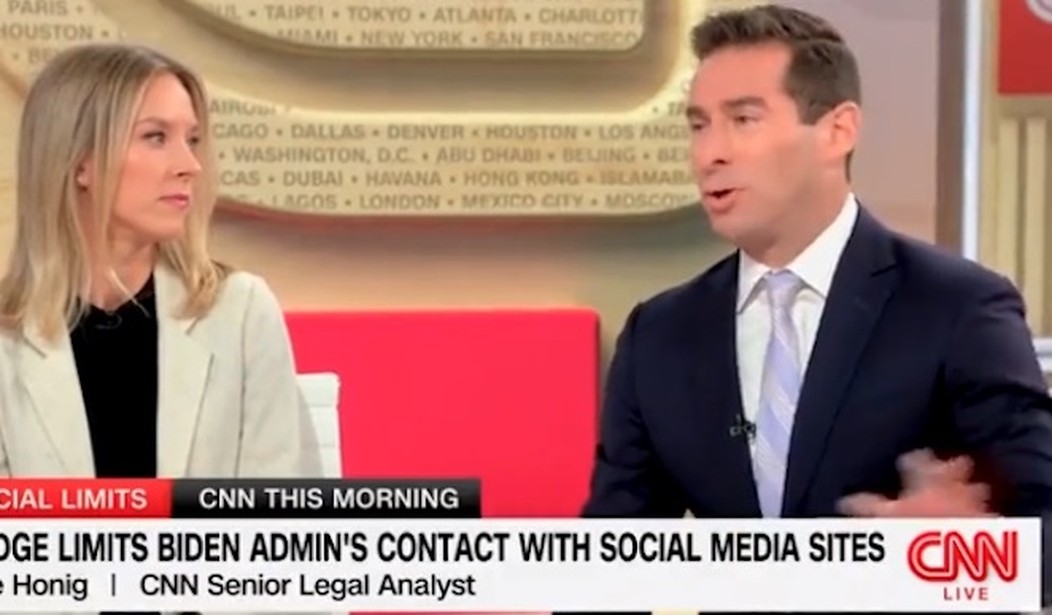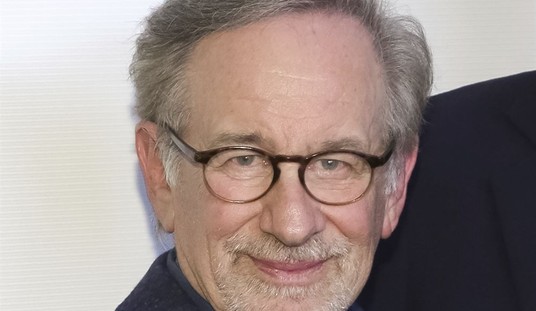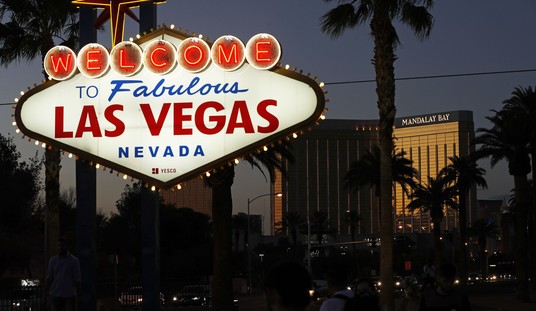The irony of this comment from CNN expert Elie Honig cannot be overstated. What exactly would give the executive branch the authority for a “day to day intersection” to impose or even suggest editorial decisions on content? Honig complains that the ruling yesterday from federal judge Terry Doughty amounts to “judicial activism” and that Doughty intends to “micromanage” that “day to day intersection.”
Honig seems to have missed the point Doughty made in this injunction. The ruling made clears that the executive branch has no business having a “day to day intersection” with anyone to censor speech, especially when it acts to suppress dissent and broad viewpoints. And Honig underscores Doughty’s point, albeit unwittingly:
CNN’s @eliehonig decries “activist” ruling ordering Biden to stop censoring Americans: “One of the most aggressive, far-reaching rulings you’ll ever see. [He’s] purporting to micromanage the day-to-day intersection btwn … the entire Executive Branch [& social media companies]” pic.twitter.com/ZMRWhA1B7M
— Tom Elliott (@tomselliott) July 5, 2023
One has to wonder just how enthusiastic Honig would be if the executive branch attempted a “day-to-day intersection” with CNN to impose editorial policies on their content. And I do mean wonder, because it certainly sounds as though Honig welcomes that kind of editorial pressure. So did employees and executives at the social-media platforms, as we have seen and has been exposed now in court.
Don’t forget that that we only know about the pressure on social-media platforms thanks to the Twitter Files and Elon Musk’s acquisition of the platform. One has to wonder whether the executive branch actually does have a “day to day intersection” with media outlets like CNN, the Washington Post, and other press organizations to suppress dissent and debate on those platforms as well. Does Musk have enough spare change left over to buy the New York Times? It might take that kind of disruption to find out just how far the Big Brother enterprise actually went — and still goes.
Honig’s dismissal of this ruling as political activism misses another point and corroborates Doughty’s reasoning:
HONIG: It’s a dramatic decision by this judge. If you read through it, he’s citing to literature and George Washington and Ben Franklin. Here’s what really is astonishing to me. This is a conservative ideology that clearly comes through in this decision. It’s a conservative political ideology, right? We saw some of the quotes questioning vaccines, questioning masks — conservative talking points.
Yes — and that was the point. Doughty wasn’t making those claims for his own speech, or attempting to advance those criticisms or any other “conservative political ideology.” Doughty quoted those dissenting remarks as examples of speech that the government censored by proxy through these social-media platforms. Honig inadvertently underscores Doughty’s ruling by making clear that the intent of this censorship regime was to suppress “conservative talking points” on vital public policy.
Had Honig actually read the order all the way to the end, he would have seen Doughty’s summation of the pattern of speech suppression created by this “day to day intersection” of the executive branch and speech platforms. Honig may not agree with it, but perhaps he’d have been a little smarter than to all but endorse Doughty’s conclusions, emphasis mine:
Opposition to COVID-19 vaccines; opposition to COVID-19 masking and lockdowns; opposition to the lab-leak theory of COVID-19; opposition to the validity of the 2020 election; opposition to President Biden’s policies; statements that the Hunter Biden laptop story was true; and opposition to policies of the government officials in power. All were suppressed. It is quite telling that each example or category of suppressed speech was conservative in nature. This targeted suppression of conservative ideas is a perfect example of viewpoint discrimination of political speech. American citizens have the right to engage in free debate about the significant issues affecting the country.
The part about the Hunter Biden laptop makes another important point, which is that this censorship regime predated Joe Biden’s presidency. Executive branch agencies created this from the “misinformation” panic after the 2016 election on their own without any writ from Congress or even much debate over these tactics. Their effort arguably influenced the national election that took place in the middle of the acute suppression effort on the Hunter laptop story, and has broadened since to silence those who challenge executive-branch policies on a wider basis.
The government never had any business at all imposing editorial decisions on speech platforms, either by influence or intimidation — or as we see, both. The Constitution expressly forbids the government from playing that role. Doughty’s ruling is not an example of “judicial activism,” but a badly needed corrective against the kind of tyranny that was so anathema to the founders that they explicitly prohibited it in the First Amendment. And contra Honig, Doughty isn’t proposing to “micromanage” this Big Brother “day to day intersection” — he’s proposing to end it, except in the very limited counter-intelligence and law-enforcement aspects for which the federal government has legitimate authorization. As he should, and as the Constitution dictates.








Join the conversation as a VIP Member